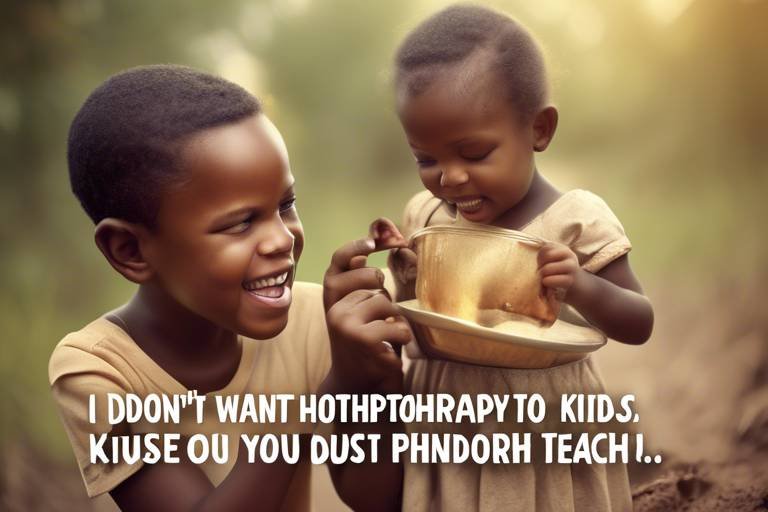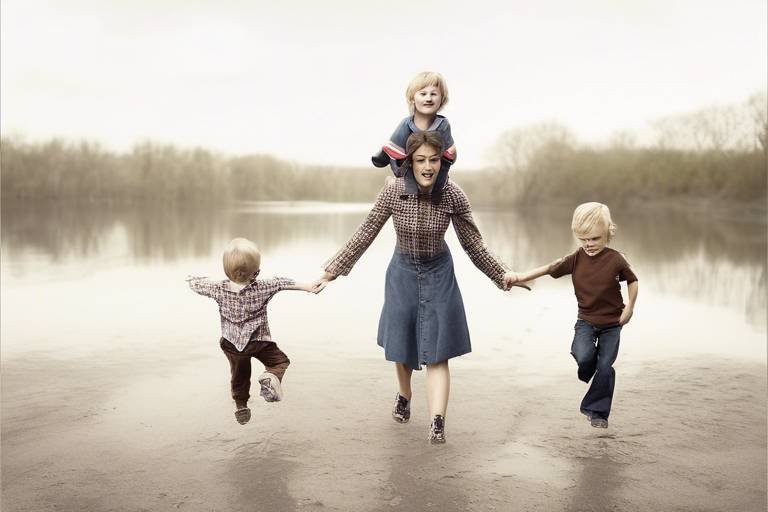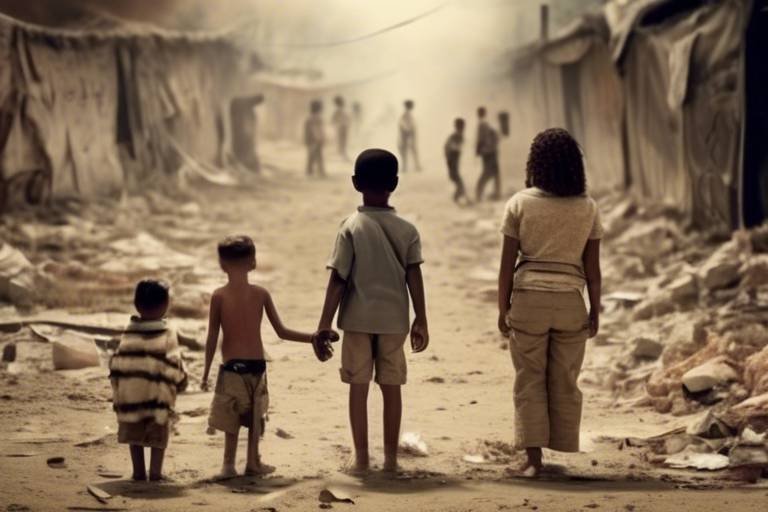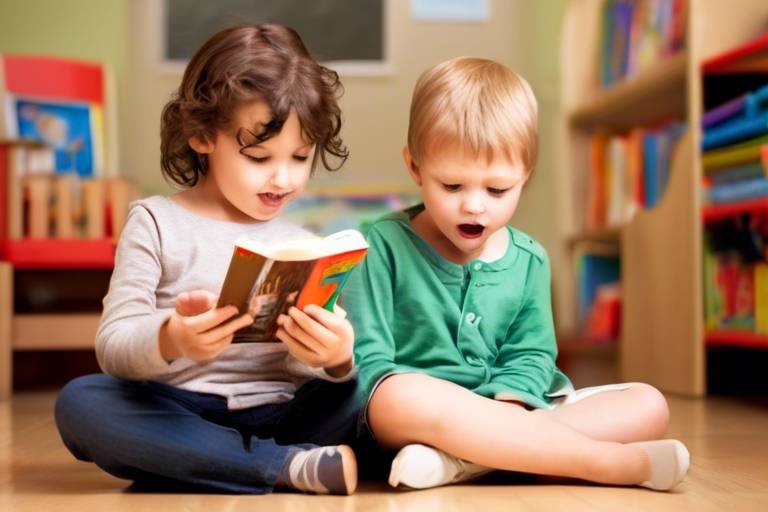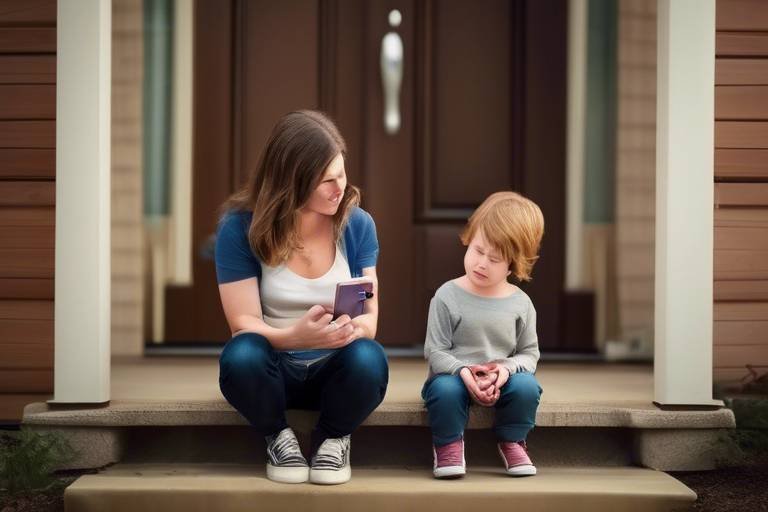Helping Your Child Navigate Friendship Problems
Friendship is one of the most beautiful yet complex aspects of childhood. As parents, we often wish we could shield our kids from the heartaches and challenges that come with making and maintaining friendships. However, the reality is that navigating friendship problems is a critical part of growing up. In this article, we will explore effective strategies and insights that can help your child manage these challenges, fostering resilience and promoting healthy social interactions throughout their developmental journey.
Imagine friendships as delicate plants that need nurturing to grow. Just like a gardener tends to their flowers, parents can play a pivotal role in helping their children cultivate strong, healthy relationships. By understanding the dynamics of friendships and the common issues that arise, you can guide your child through the ups and downs of their social life.
Friendship problems can feel overwhelming for kids, often leading to feelings of isolation or frustration. As they encounter issues like exclusion, jealousy, or misunderstandings, it's essential for parents to step in with support and guidance. This article will equip you with the knowledge and tools necessary to help your child face these challenges head-on, ultimately leading to more fulfilling relationships.
So, whether your child is dealing with a falling out with a best friend or simply struggling to fit in with a new group, remember that you're not alone in this journey. Together, we can explore the intricacies of friendship and empower your child to thrive in their social world.
- What should I do if my child is excluded from a group? - Encourage them to express their feelings and discuss possible solutions together.
- How can I help my child handle jealousy among friends? - Teach them the importance of empathy and understanding others' perspectives.
- What are some signs that my child is struggling with friendships? - Look for emotional changes or behavioral shifts, such as withdrawal or aggression.

Understanding Friendship Dynamics
Friendships are like intricate tapestries woven from various threads of emotion, trust, and shared experiences. Understanding the dynamics of these relationships is crucial for parents who want to help their children navigate the often tumultuous waters of social interactions. At the heart of every strong friendship lies trust, which serves as the foundation upon which children can build their connections. Trust allows friends to feel safe and secure, knowing that they can rely on one another for support and understanding.
Another essential element of friendship is communication. Just as a bridge connects two sides of a river, effective communication connects the hearts and minds of friends. Teaching children how to express their feelings openly and honestly can prevent misunderstandings that often lead to conflict. It’s important for children to learn that sharing their thoughts and feelings isn’t just about voicing complaints; it’s about engaging in a dialogue that fosters mutual understanding.
Moreover, empathy plays a vital role in friendship dynamics. When children learn to put themselves in their friends' shoes, they develop a deeper understanding of others' feelings and perspectives. This ability to empathize not only helps in resolving conflicts but also strengthens the bond between friends. It’s like having a superpower that allows them to connect on a more profound level, making their friendships more meaningful and resilient.
To further illustrate these dynamics, consider the following table that outlines the key components of healthy friendships:
| Component | Description |
|---|---|
| Trust | Feeling safe and secure in sharing thoughts and feelings. |
| Communication | Open dialogue that fosters understanding and prevents misunderstandings. |
| Empathy | Understanding and relating to the feelings of others. |
By helping children recognize and appreciate these fundamental qualities, parents can guide them toward developing healthier, more fulfilling friendships. It’s essential to encourage children to reflect on their interactions and consider how trust, communication, and empathy play a role in their relationships. This understanding not only enhances their social skills but also prepares them for the complexities of adult relationships in the future.
Ultimately, the goal is to empower children with the knowledge and tools they need to navigate friendship dynamics successfully. By fostering an environment where these qualities are valued and practiced, parents can help their children build strong, lasting connections that will serve them well throughout their lives.

Common Friendship Issues
Friendships can be a beautiful part of childhood, but they can also come with their fair share of challenges. Just like navigating a maze, children often encounter twists and turns that can lead to confusion and frustration. Understanding these common friendship issues is essential for parents who want to help their children thrive socially. Some of the most frequent problems include exclusion, jealousy, and misunderstandings. Each of these issues can impact a child's emotional well-being and social development, making it crucial for parents to be aware of them.
Exclusion can feel like a punch to the gut for a child. When friends leave someone out of activities or conversations, it can create feelings of loneliness and inadequacy. For instance, imagine a group of friends planning a birthday party and intentionally not inviting one child. This not only hurts that child's feelings but can also lead to a cycle of isolation, where the excluded child may find it harder to make new friends. Parents should encourage their children to be inclusive and remind them of the importance of empathy in friendships.
Jealousy is another common issue that can rear its ugly head in friendships. Children might feel envious when a friend achieves something they desire, like receiving praise from a teacher or getting a new toy. This jealousy can lead to unhealthy competition or even resentment. Parents can help their children understand that it's okay to feel jealous, but it's crucial to express those feelings constructively. Teaching children to celebrate their friends' successes can help mitigate these jealous feelings and foster a more supportive environment.
Misunderstandings can often arise from poor communication. A simple comment taken out of context can snowball into a major conflict. For example, if one child jokingly teases another but the joke is misinterpreted, it can lead to hurt feelings and arguments. Parents should emphasize the importance of clear communication and encourage their kids to talk things out when conflicts arise. This not only helps to resolve issues but also teaches children valuable skills for handling relationships in the future.
By recognizing these common friendship issues, parents can better equip their children to navigate the complexities of social interactions. It's important to foster an environment where children feel safe discussing their feelings and experiences. Open dialogue can lead to greater understanding and resilience, paving the way for healthier and more fulfilling friendships.
- What should I do if my child feels excluded from a group? Encourage them to talk about their feelings and remind them of the importance of inclusivity. Help them find new friends or activities where they can feel accepted.
- How can I help my child deal with jealousy? Teach them to express their feelings and celebrate their friends' successes. Encourage them to focus on their own strengths and achievements.
- What are some signs that my child is struggling with friendships? Look for changes in behavior, such as withdrawal from social activities, increased irritability, or changes in mood when discussing friends.

Signs of Friendship Struggles
Friendship is a vital part of childhood, but sometimes, it can be a rocky road. As parents, it’s essential to be vigilant and recognize the that your child may be experiencing. These signs can manifest in various ways, often reflecting emotional and behavioral changes that can indicate deeper issues in their social interactions.
One of the most telling signs is a shift in your child's mood. If you notice that your child is becoming more withdrawn or irritable, it could suggest that they are facing challenges in their friendships. Children often wear their emotions on their sleeves, and if they are suddenly less enthusiastic about social activities or seem to dread going to school, it might be time to dig a little deeper into what’s going on.
Another indicator can be found in their interactions with peers. Are they frequently complaining about feeling excluded or left out? This feeling of isolation can be incredibly painful for children, and it’s crucial for parents to acknowledge these feelings. In some cases, children may express their struggles through aggressive behavior or by lashing out at siblings or friends, which can be a red flag indicating that they are struggling to cope with their social environment.
To further assist in identifying these struggles, here are some common emotional and behavioral indicators to keep an eye on:
- Changes in mood: Frequent mood swings or increased irritability.
- Social withdrawal: A noticeable decrease in the desire to engage with friends or participate in social activities.
- Increased complaints: Regular expressions of feeling left out or excluded from peer groups.
- Behavioral changes: Uncharacteristic aggression or frustration directed towards others.
Understanding these signs can empower you to intervene early and provide the necessary support. Remember, children often don’t have the words to articulate their feelings, so it’s up to us as parents to be their advocates. By fostering a supportive environment, you can help your child navigate their friendship challenges and develop the resilience they need to thrive socially.
Q: How can I tell if my child is struggling with friendships?
A: Look for changes in their mood, social withdrawal, or signs of aggression. If they frequently express feelings of exclusion, these can be strong indicators of friendship struggles.
Q: What should I do if I notice these signs?
A: Open a line of communication. Talk to your child about their feelings and experiences. Offer support and guidance, and consider involving a teacher or counselor if necessary.
Q: Can friendship struggles affect my child's overall well-being?
A: Yes, friendship struggles can significantly impact a child's emotional health, self-esteem, and overall happiness. Addressing these issues early can help mitigate long-term effects.

Emotional Indicators
When it comes to understanding the emotional landscape of children, recognizing the that signal friendship struggles is crucial. Children are often not equipped with the vocabulary or the emotional intelligence to articulate their feelings, which means that subtle signs can be easily overlooked. For instance, if your child suddenly becomes withdrawn or displays a shorter temper than usual, these could be red flags indicating that something is amiss in their social interactions. It's essential to create a safe space where they feel comfortable sharing their feelings, as this can lead to early identification of potential problems.
Moreover, emotional changes can manifest in various ways. A child might exhibit anxiety or sadness when discussing friends or school, which could indicate underlying friendship issues. It's also important to pay attention to their body language. Are they avoiding eye contact? Do they seem less enthusiastic about activities they once loved? These non-verbal cues can often speak louder than words.
Here are some common emotional indicators to watch for:
- Increased Irritability: If your child seems to snap at family members or friends over minor issues, it could be a sign of underlying frustration related to their friendships.
- Frequent Mood Swings: Rapid changes in mood, especially when discussing friends, may indicate emotional turmoil.
- Isolation: A noticeable shift towards spending more time alone instead of engaging with peers can be a significant indicator of friendship troubles.
- Reluctance to Attend Social Events: If your child suddenly dreads birthday parties or playdates, it may be a sign that they are struggling with their friendships.
By tuning into these emotional indicators, parents can better support their children in navigating the complexities of friendships. It's like being a detective in your child's emotional world; the more you observe, the clearer the picture becomes. Remember, addressing these emotional cues early on can provide your child with the tools they need to foster healthier relationships and develop resilience in the face of social challenges.
Q: How can I help my child express their feelings about friendship issues?
A: Encourage open dialogue by asking open-ended questions about their day and feelings. Use prompts like, "How did you feel when...?" to help them articulate their emotions.
Q: What should I do if my child is exhibiting signs of emotional distress?
A: It's essential to approach the situation with empathy. Validate their feelings and encourage them to share their experiences. If necessary, consider seeking guidance from a child psychologist or counselor.
Q: How can I teach my child to recognize their emotional indicators?
A: Help them create a feelings chart or journal where they can track their emotions daily. Discuss what different feelings look like and how they can express them appropriately.

Behavioral Changes
When it comes to friendship challenges, children often express their struggles through various . These changes can serve as crucial indicators for parents to recognize when their child may be facing issues in their social circles. For instance, a previously outgoing child may start to exhibit signs of withdrawal, preferring to stay home rather than engage in playdates or group activities. This shift could be a signal that they are feeling excluded or hurt by their peers.
On the other hand, some children may respond to friendship problems with aggression. This can manifest as irritability, uncharacteristic outbursts, or even bullying behaviors directed at others. Such actions might stem from feelings of frustration or inadequacy, and they can create a cycle of conflict that further alienates the child from their peers. It's essential for parents to be vigilant and recognize these signs early on, as they can help to facilitate important conversations that can lead to a resolution.
Additionally, children might display changes in routines or interests. For example, a child who once loved playing soccer may suddenly lose interest, opting to stay indoors instead. This can be a sign that they are struggling with friendships on the field, possibly feeling left out or overshadowed by other players. Understanding these behavioral changes allows parents to approach their children with empathy and support, creating an open dialogue about their feelings and experiences.
To help parents identify these behavioral shifts more effectively, here are some common indicators to watch for:
- Increased withdrawal: Spending more time alone or avoiding social situations.
- Heightened irritability: Exhibiting more mood swings or anger than usual.
- Loss of interest in activities: Disinterest in hobbies or sports they once enjoyed.
- Changes in friendships: Sudden shifts in who they spend time with or a decrease in social interactions.
By being aware of these behavioral changes, parents can take proactive steps to address any underlying issues. It’s about creating a supportive environment where children feel safe to express themselves. After all, navigating friendships can be tricky, and having a trusted adult to turn to can make all the difference in helping them overcome their challenges.
Q: What should I do if my child is showing signs of withdrawal?
A: Start by having an open and honest conversation with your child. Encourage them to share their feelings and experiences regarding their friendships. Sometimes, just knowing that someone is there to listen can be incredibly comforting.
Q: How can I help my child who is acting aggressively towards others?
A: It’s important to address aggressive behavior immediately. Discuss with your child the impact of their actions on others and help them find healthier ways to express their emotions. Consider role-playing different scenarios to practice appropriate responses.
Q: When should I seek professional help for my child's friendship problems?
A: If you notice persistent behavioral changes that do not improve over time, or if your child seems deeply affected by their friendships, it may be beneficial to consult a child psychologist or counselor for additional support.

Encouraging Open Communication
Encouraging open communication with your child about their friendships is like opening a window to fresh air; it allows for clarity and understanding to flow in. When children feel safe to express their feelings, they are more likely to share their experiences, whether they are joyful or troubling. This open dialogue is crucial for parents to understand the dynamics of their child's friendships and to offer tailored support. Remember, children often think in a different language than adults. What seems trivial to us might be monumental to them. So, how can we create an environment that fosters this kind of communication?
Start by being approachable. Let your child know that they can talk to you about anything without fear of judgment. You might say something like, "Hey, I noticed you seem a bit off lately. Want to chat about it?" This simple invitation can open the floodgates of conversation. It's essential to listen actively; nodding, maintaining eye contact, and summarizing what they say shows them that you value their feelings. This active engagement helps build trust, making them more willing to share in the future.
Moreover, consider setting aside regular times to check in with your child. Perhaps during dinner or car rides, where the casual atmosphere can make it easier for them to share. You could ask open-ended questions such as:
- “What was the best part of your day?”
- “Did anything happen at school that made you feel upset?”
- “Who did you play with today?”
These questions encourage them to elaborate rather than just giving one-word answers. It’s also crucial to validate their feelings, even if you don’t fully understand them. Saying something like, "I can see why that would upset you," can be incredibly powerful. It reassures them that their feelings are legitimate and important.
Another effective strategy is to share your own experiences. Relating personal stories about your childhood friendships, including the struggles you faced and how you overcame them, can create a bond. It shows your child that everyone goes through rough patches and that it’s okay to talk about them. This not only normalizes their feelings but also provides them with strategies to cope.
Finally, encourage your child to express their feelings through different mediums. Some children might find it easier to write in a journal or draw pictures to depict their emotions. This can be particularly helpful for kids who are shy or struggle with verbal communication. You could even create a 'feelings chart' together, where they can point out how they feel on any given day. This visual aid can serve as a conversation starter and help you gauge their emotional state over time.
In conclusion, fostering open communication is about creating a safe space for your child to express themselves. With your support, they can navigate the complex world of friendships with confidence and resilience. Remember, the goal is to be their trusted ally, guiding them through the ups and downs of their social interactions.
Q: How can I tell if my child is comfortable talking to me about their friendships?
A: Look for signs of openness, such as them initiating conversations or sharing details about their day. If they feel at ease discussing their feelings, it's a good indicator that they trust you.
Q: What should I do if my child refuses to talk about their friends?
A: Respect their boundaries but gently encourage dialogue. You might try engaging them in activities they enjoy, which can help them feel more relaxed and open up over time.
Q: How can I help my child if they are experiencing bullying?
A: It's crucial to listen and validate their feelings. Encourage them to speak to a teacher or school counselor, and work with them to develop strategies for handling the situation.

Teaching Conflict Resolution Skills
In the intricate dance of childhood friendships, conflicts are as inevitable as a rainy day. Teaching your child conflict resolution skills is akin to giving them an umbrella—it's essential for navigating the storms that may arise in their social interactions. When children learn how to address disputes constructively, they not only enhance their relationships but also cultivate a sense of confidence that will serve them throughout life. So, how can we equip our little ones with these invaluable tools?
First, it's crucial to introduce the concept of active listening. This means more than just hearing words; it's about understanding feelings and perspectives. Encourage your child to listen attentively when their friend is upset. Ask them to reflect back what they heard, which helps in validating the other person's feelings. For example, if a friend feels excluded, your child can say, “I understand that you felt left out when we played without you.” This simple technique can diffuse tension and foster empathy, paving the way for healthier resolutions.
Next, teach your child the art of finding compromise. This is where the magic happens! It's about meeting halfway and recognizing that both parties may need to adjust their expectations. You can role-play different scenarios where a disagreement arises—maybe over a game or a shared toy. Guide them through the process of brainstorming solutions together. For instance, if two kids want to play different games, they could agree to play one for a set time and then switch. This not only resolves the issue but also teaches collaboration and respect for one another's preferences.
Moreover, it’s important to instill the idea that conflicts can be opportunities for growth. When your child encounters a disagreement, encourage them to view it as a chance to strengthen their friendship. Ask them reflective questions like, “What can we learn from this situation?” or “How can this make our friendship better?” This perspective shift helps them to see that while conflicts may be uncomfortable, they can lead to deeper understanding and stronger bonds.
To further enhance their conflict resolution skills, consider introducing a simple conflict resolution model that they can remember easily. Here’s a basic structure you can teach them:
| Step | Description |
|---|---|
| 1. Identify the Problem | Discuss what the conflict is about. |
| 2. Express Feelings | Share how each person feels about the situation. |
| 3. Brainstorm Solutions | Think of possible ways to resolve the issue. |
| 4. Agree on a Solution | Choose a solution that works for both parties. |
| 5. Follow Up | Check in later to see how the solution is working. |
Finally, remember that modeling is one of the most powerful teaching tools. Children learn best by observing the adults in their lives. When conflicts arise in your household, demonstrate how to handle them with grace and respect. Show them how to communicate openly, listen actively, and find common ground. When they see you navigating disagreements with kindness and understanding, they'll be more likely to emulate those behaviors in their own friendships.
In summary, teaching your child conflict resolution skills is a gift that keeps on giving. It not only prepares them for the challenges of childhood friendships but also sets the foundation for healthy relationships in adulthood. By fostering these skills, you're not just helping them solve problems; you're empowering them to build connections that are resilient and meaningful.
- What age should I start teaching my child conflict resolution skills?
It's never too early to start! Even preschoolers can benefit from basic concepts of sharing and taking turns. - How can I help my child if they struggle with conflict resolution?
Encourage practice through role-playing scenarios and provide positive reinforcement when they successfully navigate a conflict. - What if my child doesn't want to talk about their conflicts?
Respect their feelings but gently encourage them to express themselves. Sometimes, writing down their thoughts can help them articulate their feelings.

Active Listening Techniques
This article explores effective strategies and insights to assist children in managing friendship challenges, fostering resilience, and promoting healthy social interactions throughout their developmental journey.
Exploring the essential elements of friendships, including trust, communication, and empathy, helps parents guide their children in recognizing the importance of these qualities in building and maintaining healthy relationships.
Identifying typical friendship problems children face, such as exclusion, jealousy, and misunderstandings, equips parents with the knowledge to address these challenges proactively and effectively.
Recognizing the signs that indicate a child is experiencing friendship difficulties can help parents intervene early and provide necessary support to promote healthier social interactions.
Children often exhibit emotional changes when facing friendship issues. Understanding these emotional indicators can help parents identify when their child may need extra support.
Changes in behavior, such as withdrawal or aggression, can signal friendship problems. Parents should be alert to these shifts to provide timely assistance and guidance.
Fostering an environment of open communication allows children to express their feelings about friendships, enabling parents to offer support and guidance tailored to their child's unique experiences.
Equipping children with conflict resolution skills empowers them to address disputes with peers constructively, promoting healthier relationships and reducing the likelihood of recurring issues.
Active listening is a crucial skill that can transform the way children interact with their friends. It involves not just hearing the words being said, but truly understanding the feelings and intentions behind them. When children practice active listening, they become more empathetic and better equipped to handle conflicts. Here are some effective techniques:
- Maintain Eye Contact: Encourage your child to look at the speaker. This simple act shows that they are engaged and interested in what their friend is saying.
- Avoid Interrupting: Teach your child the importance of letting their friends finish speaking before responding. Interrupting can lead to misunderstandings and hurt feelings.
- Reflect Back: Encourage your child to paraphrase or summarize what their friend has said. This not only shows that they are listening but also helps clarify any potential miscommunications.
- Ask Open-Ended Questions: Prompt your child to ask questions that encourage deeper conversation, such as “How did that make you feel?” This invites their friend to share more and fosters a stronger connection.
By incorporating these active listening techniques into their daily interactions, children can significantly improve their friendships. They will learn to appreciate different perspectives, which is essential when navigating the ups and downs of social relationships. It's like tuning into a radio station—if the signal is clear, the music (or conversation) flows smoothly. However, if there’s static (misunderstanding), the message can get lost. So, let’s help our kids turn up the volume on their listening skills!
Helping children develop resilience enables them to bounce back from friendship challenges, fostering a positive mindset and encouraging them to pursue healthy social connections despite setbacks.
Teaching children to engage in positive self-talk can boost their confidence and resilience, making it easier for them to navigate friendship challenges with a constructive mindset.
Parents can influence their children's understanding of friendships by modeling healthy relationships, demonstrating effective communication, empathy, and conflict resolution in their interactions.
Q: How can I tell if my child is having friendship problems?
A: Look for signs such as changes in mood, withdrawal from social activities, or reluctance to talk about friends.
Q: What should I do if my child is being bullied by a friend?
A: Encourage open communication, help them express their feelings, and consider involving a teacher or counselor if necessary.
Q: How can I teach my child to be a good friend?
A: Model positive behaviors, encourage kindness, and discuss the importance of empathy and respect in friendships.

Finding Compromise
Compromise is like a dance; it requires two partners to move in sync, adjusting their steps to create harmony. When children learn to find compromise in their friendships, they not only resolve conflicts but also build stronger bonds with their peers. It's essential for parents to guide their children in understanding that compromise doesn't mean giving up entirely; rather, it's about finding a middle ground where both parties feel heard and valued.
To illustrate this point, consider a scenario where two friends, Emma and Jack, want to play different games during recess. Emma wants to play soccer, while Jack prefers basketball. Instead of one child dominating the decision, they can find a compromise by playing soccer for the first half of recess and switching to basketball for the second half. This simple act of negotiation not only resolves their immediate conflict but also teaches them the value of flexibility and teamwork.
Encouraging children to practice compromise requires a few key strategies:
- Modeling Behavior: Children learn best by observing adults. When parents demonstrate how to negotiate and find common ground in their own relationships, they provide a live example for their kids to emulate.
- Role-Playing: Engage in role-playing scenarios where children can practice compromising in a safe environment. This can help them feel more confident when real-life situations arise.
- Encouraging Empathy: Teach children to put themselves in their friends' shoes. Understanding how their friends feel can lead to more thoughtful compromises.
Moreover, it's important to remind children that compromise is a skill that takes time to develop. Just like learning to ride a bike, they may wobble and fall at first, but with practice, they will become more adept at balancing their needs with those of their friends. Encourage them to celebrate their successes, no matter how small, as these moments contribute to their growth in social skills.
In conclusion, finding compromise in friendships is a vital skill that promotes cooperation and understanding. By teaching children how to navigate differences and work towards mutual agreement, parents can help them build resilient relationships that will serve them well throughout their lives. Remember, every time a child finds a compromise, they’re not just resolving a conflict; they’re laying the foundation for a more harmonious future in their social interactions.
- What is the best way to teach my child to compromise? Start by modeling compromise in your own relationships and provide opportunities for them to practice through role-playing.
- How can I help my child feel confident in compromising? Encourage positive self-talk and celebrate their efforts in finding solutions with friends.
- What if my child struggles to compromise? Be patient and offer guidance, reminding them that it's a skill that takes time to develop.

Building Resilience in Friendships
Building resilience in friendships is like nurturing a garden; it requires patience, care, and the right tools to thrive. Just as plants need sunlight and water, children need support and guidance to develop the strength to face the ups and downs of social interactions. When children learn to bounce back from conflicts or disappointments with their friends, they not only enhance their current relationships but also prepare themselves for future ones. This resilience is crucial because friendships can be complex, filled with joy and challenges alike.
One of the most effective ways to help children build resilience is by encouraging positive self-talk. When kids learn to speak kindly to themselves, especially during tough times, they cultivate a mindset that sees challenges as opportunities for growth. For instance, if a child feels left out, instead of thinking, “I’m not good enough,” they can reframe it to, “I can try to make new friends or talk to my current friends about how I feel.” This shift in perspective can significantly impact their emotional well-being and social interactions.
Another vital aspect of building resilience is modeling healthy relationships. Children often learn by observing the adults in their lives. When parents demonstrate effective communication, empathy, and conflict resolution, they set a powerful example for their children. For instance, if a parent faces a disagreement with a friend, showing how they calmly discuss their feelings and seek a resolution teaches children invaluable skills. This modeling creates a safe space for children to understand that conflicts are normal and can be resolved positively.
Moreover, it’s essential for parents to foster an environment where children feel comfortable sharing their feelings. This open communication allows kids to express their worries or frustrations about friendships without fear of judgment. When children know they can talk about their experiences, they are more likely to seek guidance when challenges arise, rather than trying to handle everything alone.
To further illustrate the importance of resilience in friendships, consider the following table that outlines some key benefits of resilience:
| Benefit | Description |
|---|---|
| Enhanced Problem-Solving Skills | Resilient children learn to approach problems with a solution-oriented mindset, making it easier to navigate conflicts. |
| Improved Emotional Regulation | They develop the ability to manage their emotions effectively, reducing the likelihood of outbursts or withdrawal. |
| Stronger Social Connections | Resilience fosters deeper bonds with friends, as children learn to support each other through challenges. |
| Increased Confidence | With each challenge overcome, children build confidence in their social skills and ability to handle future issues. |
In conclusion, building resilience in friendships is an ongoing process that involves teaching children how to navigate the complexities of social interactions. By fostering positive self-talk, modeling healthy relationships, and encouraging open communication, parents can equip their children with the tools they need to face friendship challenges head-on. Remember, just like a garden, friendships flourish with the right care and attention!
- How can I tell if my child is struggling with friendships? Look for signs such as changes in mood, withdrawal from social activities, or reluctance to talk about friends.
- What should I do if my child is being bullied? Encourage open communication, listen to their feelings, and work with school authorities if necessary.
- How can I help my child make new friends? Encourage them to join clubs or activities that interest them, which can provide opportunities to meet new peers.
- Is it normal for children to have friendship problems? Yes, it’s quite common as children learn to navigate social dynamics; it’s a part of their development.

Encouraging Positive Self-Talk
Encouraging positive self-talk in children is like giving them a magic tool that helps them navigate the often choppy waters of friendship challenges. Imagine if every time your child faced a dilemma with a friend, they had a little voice inside their head whispering words of encouragement and reassurance. This inner dialogue can significantly influence how they perceive themselves and their relationships. By teaching children to replace negative thoughts with positive affirmations, we empower them to approach conflicts and misunderstandings with a constructive mindset.
For instance, when a child feels excluded from a group, they might think, "Nobody likes me." However, with positive self-talk, they can reframe that thought to, "I have many friends who care about me." This shift not only boosts their confidence but also helps them to see the bigger picture, reducing feelings of isolation and anxiety. It’s essential for parents to engage in discussions about self-talk, explaining how the words we say to ourselves can shape our feelings and actions.
Here are some effective strategies to encourage positive self-talk:
- Model Positive Language: Children learn by example. Use positive affirmations in your own speech, demonstrating how you talk to yourself during challenging times.
- Encourage Affirmations: Help your child create a list of positive affirmations they can repeat daily. Phrases like "I am a good friend" or "I can handle this situation" can be powerful.
- Practice Together: Make it a fun activity by practicing positive self-talk together. Role-play different scenarios where they might need encouragement and guide them in formulating positive responses.
Furthermore, it’s crucial to remind children that everyone faces difficulties in friendships, and it’s okay to feel upset or confused at times. What matters is how they choose to respond to those feelings. By fostering a habit of positive self-talk, we’re not just helping them cope with their current challenges; we’re equipping them with a lifelong skill that will serve them well in all areas of life. This practice cultivates resilience, enabling them to bounce back from setbacks and approach future friendships with optimism and openness.
In conclusion, the journey of friendship can be filled with ups and downs, but with the right mindset, children can navigate these waters with grace and confidence. Encouraging positive self-talk is a vital step in helping them build the resilience they need to thrive socially. As they learn to speak kindly to themselves, they’ll not only improve their own emotional well-being but also enhance their relationships with others.
- What is positive self-talk? Positive self-talk refers to the practice of encouraging and affirming oneself with positive statements, which can help improve self-esteem and resilience.
- How can I teach my child positive self-talk? You can teach your child positive self-talk by modeling it yourself, helping them create affirmations, and practicing together in various situations.
- Why is positive self-talk important for children? Positive self-talk is important because it helps children build confidence, cope with challenges, and maintain a healthy perspective on their friendships and social interactions.

Modeling Healthy Relationships
One of the most impactful ways parents can influence their children's understanding of friendships is by in their own lives. Children are like sponges; they absorb everything around them, especially the behaviors and attitudes of their parents. When you demonstrate effective communication, empathy, and conflict resolution in your interactions, you provide a living example of what a healthy relationship looks like. This is not just about how you interact with friends or family, but also how you handle conflicts and express emotions.
Consider this: when your child sees you resolving a disagreement with a friend calmly and respectfully, they learn that conflicts can be handled without anger or resentment. They begin to understand that it’s normal to have differences and that finding common ground is part of maintaining a relationship. When you actively listen to your partner or friends, showing that you value their opinions, your child learns the importance of active listening in their own friendships.
Moreover, it’s crucial to openly discuss your own relationships with your child. Share stories about your friendships, the challenges you’ve faced, and how you overcame them. This not only normalizes the ups and downs of friendships but also teaches resilience. Here are some key points to keep in mind when modeling healthy relationships:
- Practice Empathy: Show understanding and compassion not only towards your friends but also during family discussions. This encourages your child to do the same.
- Communicate Openly: Share your thoughts and feelings with your child. Encourage them to express themselves as well, fostering an environment where open dialogue is the norm.
- Resolve Conflicts Constructively: When disagreements arise, demonstrate how to handle them with respect and a willingness to find a solution.
By integrating these practices into your daily life, you’re not just teaching your child about friendships; you’re also instilling lifelong skills that will benefit them in all their relationships. Remember, the lessons they learn from you will shape their interactions with peers, family, and future partners. So, take a moment to reflect on your own relationships. Are they healthy? Are you setting the right example? Your actions today will pave the way for your child’s social interactions tomorrow.
Q: How can I start modeling healthy relationships for my child?
A: Begin by reflecting on your own relationships. Ensure you communicate openly, resolve conflicts respectfully, and show empathy in your interactions. Share these experiences with your child to reinforce the lessons.
Q: What if I struggle with my own friendships?
A: It’s okay to have challenges in your friendships. Use these experiences as teaching moments. Discuss what you’re learning and how you plan to improve, showing your child that growth is a continuous process.
Q: How do I encourage my child to talk about their friendships?
A: Create a safe space for discussions by asking open-ended questions about their friends and experiences. Show genuine interest and validate their feelings, which will encourage them to share more.
Frequently Asked Questions
- What are some common friendship issues children face?
Children often encounter challenges like exclusion, jealousy, and misunderstandings in their friendships. Recognizing these issues early can help parents provide the right support and guidance.
- How can I tell if my child is struggling with friendships?
Watch for emotional indicators such as sadness or anxiety, as well as behavioral changes like withdrawal or aggression. These signs can signal that your child may need extra support in navigating their friendships.
- What strategies can I use to encourage open communication with my child?
Create a safe space for your child to share their feelings about friendships. Ask open-ended questions and listen actively to their concerns, which will help them feel valued and understood.
- How can I teach my child conflict resolution skills?
Encourage active listening and finding compromises. Role-playing different scenarios can also help children practice these skills in a safe environment, making them more confident in real-life situations.
- What role does resilience play in friendships?
Building resilience helps children bounce back from friendship challenges. By encouraging positive self-talk and modeling healthy relationships, parents can foster a mindset that embraces setbacks as opportunities for growth.
- How can I model healthy relationships for my child?
Demonstrate effective communication, empathy, and conflict resolution in your interactions. Children learn a lot from observing their parents, so showing them what healthy relationships look like can have a lasting impact.


